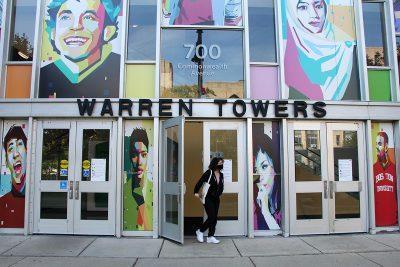
Transgender and nonbinary students say Boston University’s housing options and selection process present several challenges, including single-sex bathrooms and the lack of administrative help in finding other trans students as roommates.
BU offers gender-neutral housing in all residences “with the exception of Claflin, Rich and Sleeper Halls; the Warren Towers complex; and The Towers,” as listed on their website.
University spokesperson Colin Riley wrote in an email the majority of incoming freshmen are placed in these large gendered dorms as well as small brownstones, specialty housing and in some cases living-learning communities. The Housing website states “freshmen are not eligible to live in gender-neutral housing, regardless of residence location.”
Two to three percent of sophomores, juniors and seniors elect to live in gender neutral housing each year, Riley wrote.
Riley added that incoming trans and nonbinary freshmen can contact BU Housing to request specific accommodations.
“We work with the individual student to identify the building and room type where they will be most successful,” Riley wrote.
However, transgender and nonbinary students in recent years have reported oversights in housing assignments.
Marshall Brown, a transgender male and rising sophomore in the College of Communication, lived in Warren Towers his freshman year and is moving off campus this fall. He said he reached out to Housing before the start of the Fall semester last summer.
“I said me being trans was a concern and I want to be paired with another trans person or I want to be put in gender-inclusive housing,” Brown said. “They said that they’re very busy with COVID housing, and then never got back to me.”
Brown said while he lived on a co-ed floor, it was on the female side.
“I was able to use my preferred bathroom, but it was uncomfortable because they put me on the wrong side of the hall.” he said. “That’s my experience in gendered housing.”
Dante Gonzalez, a trans man and rising sophomore in the College of Fine Arts, lived in Kilachand Hall his freshman year and will remain there for the upcoming year. He also tried to contact Housing about the possibility of gender-neutral housing last summer, he said.
“I tried reaching out to someone to try and figure out what gender-neutral housing looked like for trans students, but it didn’t really feel like a feasible option,” Gonzalez said. “I didn’t have any particular person in the community that I wanted to connect with and live with.”
Riley said in an interview it can be difficult to provide transgender students with single rooms given the limited availability of the rooms, so Housing works with them individually to find the best possible placement.
A single room without a private bathroom costs $14,290, and with a private bathroom, $15,330 for the 2021-2022 academic year. A double, triple or quad ranges in price from $10,990 to $13,670.
Saman B-Razavi is a rising sophomore in the College of Arts and Sciences and transgender male who lived in Warren Towers his freshman year. He pointed to the use of communal bathrooms within the residence as an everyday struggle — a common complaint among trans students interviewed.
“You’re going to have to worry about, for me, making people comfortable in one bathroom, or feeling comfortable yourself in another bathroom, which is really annoying,” B-Razavi said.
Warren Towers includes only single-sex communal bathrooms on its residential floors.
B-Razavi said he chose the Core House as his residence this fall in part for its gender-neutral bathrooms.
The University has “no immediate plans to create more gender-neutral bathrooms in existing buildings,” Riley wrote in his email.
Gonzalez noted the inconvenience posed by the lack of gender neutral restrooms in his Kilachand Hall residence.
“I don’t think my dorm has a single gender-neutral bathroom,” Gonzalez said. “If I need to take a break before heading out for the day, I would need to be able to get back into my dorm and use my personal bathroom in order to feel comfortable, and sometimes that’s just not a possibility.”
Another challenge for trans students, noted B-Razavi, is finding a trans roommate.
“It’s just annoying that there’s no way to find roommates that are also trans,” B-Razavi said. “At the Core House I had a roommate at first and [she] was a girl … and she wasn’t comfortable rooming with me.”
Brown suggested possibly adding an option to the housing profile for trans students to find each other.
The solution, said Dani Williams, a nonbinary rising sophomore in CAS, comes down to listening to trans and nonbinary students.
“Maybe hosting a meeting where we could get together with the Queer [Activist] Collective or with nonbinary students,” Williams said. “Just making a priority to, within the housing form, putting ‘are you nonbinary, what kind of housing do you feel comfortable with, how can we assist you during this time’ and just making it easier for students.”
Riley noted changes or improvements in support of transgender and nonbinary students are “not a housing issue, that’s a University issue,” and BU will remain committed to “[supporting] all of our students.”
BU Housing declined to comment.




















































































































